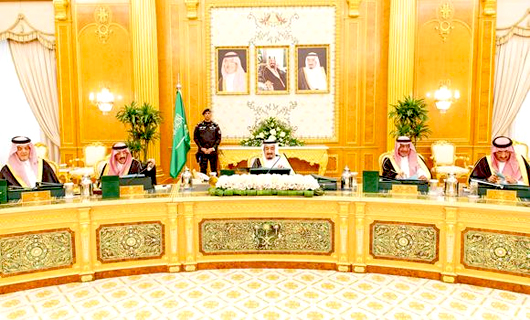Riyadh, Apr 7: The Council of Ministers on Monday said that the Saudi-led operation in Yemen has the support of Yemenis in the Kingdom and the international community because it seeks to restore the legitimate government and bring peace and stability to that war-torn nation.
The weekly meeting was chaired by Custodian of the Two Holy Mosques King Salman at Al-Yamamah Palace in Riyadh.
It noted the heroic efforts of the coalition forces in neutralizing the military capacity of the Houthi militants, said Minister of Culture and Information Adel Al-Toraifi.
Saudi Arabia appreciates the support of the Yemeni community for Operation Decisive Storm.
The ministers said the coalition does not seek a war but wants to protect the Yemeni people.
This is why the operation has been hailed by Arab and Islamic nations, and the wide international community, said Al-Toraifi.
The Cabinet also expressed hope that the nuclear framework agreement struck with Iran in Lausanne, Switzerland, recently would ensure the safety and security of the region.
It said the Kingdom and the Arab League support nations wanting to use nuclear energy for peaceful purposes in line with the standards and procedures of the International Atomic Energy Agency.
The aim would be to create a region free of all weapons of mass destruction, including nuclear weapons, said Al-Toraifi.
The Cabinet stressed that the security in the region requires a commitment to the principles of good neighborliness and non-interference in the internal affairs of Arab countries.
The ministers also welcomed the announcement of the International Criminal Court (ICC) that it formally accepted the State of Palestine as a full member.
They believe that Palestine’s accession to the ICC would help restore the rights of the Palestinians.
According to Al-Toraifi, the Council of Ministers again called on the international community to end the “Syrian tragedy which has become a humanitarian catastrophe.”
The meeting was inaugurated by Sheikh Sabah Al-Ahmad Al-Jaber Al-Sabah, emir of Kuwait, who said the Kingdom has spared no effort in providing assistance to Syrian refugees. He said Saudi aid to the Syrian people since 2011 has exceeded $600 million.
The Council of Ministers welcomed the announcement by Moody’s credit rating agency to rank the Kingdom at a high Aa3, and the Fitch credit rating of AA, which both foresee a stable future for the Kingdom.
This was a result of the Kingdom’s economic policies, which has enabled it to counter global financial crises, the Cabinet said.
The Cabinet also condemned the terrorist attack that targeted the University of Garissa, in Kenya, and expressed its condolences to the government and people of Kenya, and the families of the victims.
King Salman briefed the Cabinet on the results of his talks with various leaders who visited Saudi Arabia recently, including the Senegal president, and the President of Azerbaijan Ilham Aliyev.
The king also received various calls, including from the US president, and leaders of Sudan, India, Afghanistan and Britain.







Comments
Add new comment